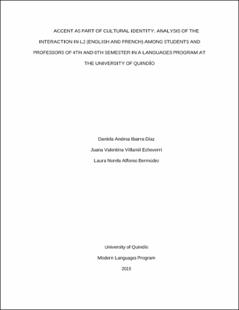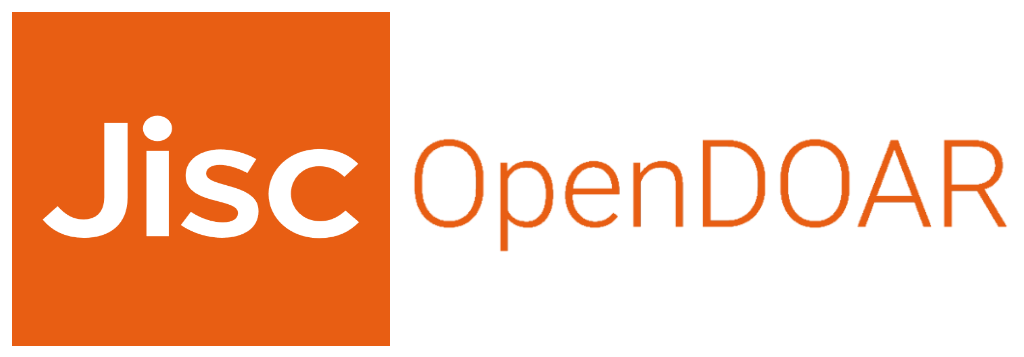Mostrar el registro sencillo del ítem
Accent as part of cultural identity: analysis of the interaction in l2 (English and French) among students and professors of 4th and 6th semester in a languages program at the university of Quindío
| dc.contributor.advisor | Álzate Ortiz, Paola | |
| dc.contributor.author | Ibarra Díaz, Daniela Andrea | |
| dc.contributor.author | Villamil Echeverri, Juana Valentina | |
| dc.contributor.author | Alfonso Bermúdez, Laura Norela | |
| dc.date.accessioned | 2023-01-31T18:37:06Z | |
| dc.date.available | 2018-12-05 | |
| dc.date.available | 2023-01-31T18:37:06Z | |
| dc.date.issued | 2018-12-05 | |
| dc.identifier.uri | https://bdigital.uniquindio.edu.co/handle/001/6298 | |
| dc.description.abstract | This qualitative research provides insight into how the mother tongue’s accent present in the L2 oral production entails the culture of the speaker and how this, in turn, is a sign of the subject’s identity. This project was carried out within a languages program at the University of Quindío. Two groups from 4th and 6th semester were observed at four different times to achieve the purpose of the study. The interviewed population consisted of four professors and twenty students who answered questions that inquired what their perceptions were concerning native-like accent and L2 accented speech. Likewise, the data analysis showed that L2 accented speech was a signature of the speaker’s identity and worldview. It also reflected that social stereotypes regarding the mother tongue’s accent in the L2 production, was seen as something undesirable and necessary to eliminate. This study concluded that although there were some subjects who considered L2 accented speech as a trait that had to be neutralized, the vast majority asserted that their mother tongue’s accent was a symbol of who they were in the world | eng |
| dc.description.abstract | Esta investigación cualitativa proporciona información sobre cómo el acento de la lengua materna presente en la producción oral de L2, refleja la cultura del hablante y cómo esto, a su vez, es un signo de la identidad del sujeto. Este proyecto se llevó a cabo dentro de un programa de idiomas en la Universidad del Quindío. Se observaron dos grupos del cuarto y sexto semestre en cuatro momentos diferentes para lograr el propósito del estudio. La población entrevistada estaba conformada por cuatro profesores y veinte estudiantes que respondieron preguntas que indagaban cuáles eran sus percepciones con respecto al acento nativo y el discurso acentuado en la L2. Del mismo modo, el análisis de datos mostró que el discurso acentuado era una firma de la identidad y la visión del mundo del hablante. También reflejó que los estereotipos sociales con respecto al acento de la lengua materna en la producción de L2, se consideraban como algo indeseable y necesario de eliminar. Este estudio concluyó que, aunque había algunos sujetos que consideraban que el discurso acentuado en la L2 era un rasgo que debía neutralizarse, la gran mayoría afirmó que el acento de su lengua materna era un símbolo de quiénes eran en el mundo. | spa |
| dc.description.tableofcontents | Introduction | eng |
| dc.description.tableofcontents | Statement of the problem | eng |
| dc.description.tableofcontents | Rationale | eng |
| dc.description.tableofcontents | Theoretical Framework | eng |
| dc.format.extent | 130 páginas | spa |
| dc.format.mimetype | application/pdf | spa |
| dc.language.iso | eng | spa |
| dc.rights | Derechos reservados Universidad del Quindío | spa |
| dc.rights.uri | https://creativecommons.org/licenses/by-nc-nd/4.0/ | spa |
| dc.title | Accent as part of cultural identity: analysis of the interaction in l2 (English and French) among students and professors of 4th and 6th semester in a languages program at the university of Quindío | eng |
| dc.type | Trabajo de grado - Pregrado | spa |
| dc.rights.accessrights | info:eu-repo/semantics/openAccess | spa |
| dc.rights.creativecommons | Atribución-NoComercial-SinDerivadas 4.0 Internacional (CC BY-NC-ND 4.0) | spa |
| dc.type.coar | http://purl.org/coar/resource_type/c_7a1f | spa |
| dc.type.driver | info:eu-repo/semantics/bachelorThesis | spa |
| dc.type.version | info:eu-repo/semantics/publishedVersion | spa |
| dc.relation.references | Adult Migrant English Program Research Centre. (2002). What is pronunciation?. Australia: AMEP. | spa |
| dc.relation.references | Arboleda, A. & Castro, A. (2012). The Accented EFL Teacher: Classroom Implications. Profile: Issues in Teachers' Professional Development, 14 (2), 45 - 62. Available on: https://revistas.unal.edu.co/index.php/profile/article/view/34052/40663 | spa |
| dc.relation.references | Aydemír, A. (2013). The Relationship between Cultural Identity and Accent. (Master of Arts Degree). Bílkent University, Ankara | spa |
| dc.description.degreelevel | Pregrado | spa |
| dc.description.degreename | Licenciado en Lenguas Modernas | spa |
| dc.publisher.faculty | Facultad de Ciencias de la Educación | spa |
| dc.publisher.place | Armenia, Quindío | spa |
| dc.publisher.program | Educación - Licenciatura en Lenguas Modernas | spa |
| dc.type.content | Text | spa |
| dc.type.redcol | https://purl.org/redcol/resource_type/TP | spa |
| dc.type.coarversion | http://purl.org/coar/version/c_fa2ee174bc00049f | spa |
| dc.rights.coar | http://purl.org/coar/access_right/c_abf2 | spa |














